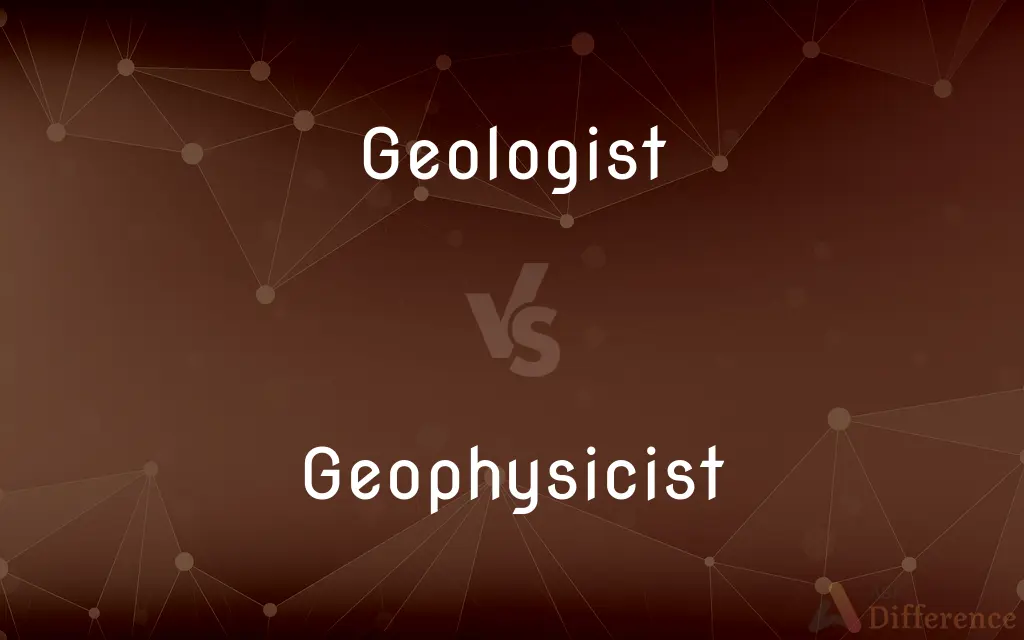Geologist vs. Geophysicist — What's the Difference?
By Fiza Rafique & Maham Liaqat — Updated on March 13, 2024
Geologists study Earth's structure and composition, while geophysicists explore physical processes affecting Earth.

Difference Between Geologist and Geophysicist
Table of Contents
ADVERTISEMENT
Key Differences
Geologists specialize in the study of the Earth's solid and liquid matter, focusing on its composition, structure, processes, and history. They examine rocks, minerals, and fossils to understand Earth's formation and the evolutionary history of life. Geophysicists, on the other hand, delve into the physical aspects of the Earth, employing principles of physics to study its magnetic, gravitational, electrical, and seismic properties. They explore the physical processes and phenomena that shape the Earth, such as earthquakes, volcanic activity, and plate tectonics, often using sophisticated instruments to measure and interpret data.
While geologists often focus on the materials that make up the Earth and the processes by which they are formed, moved, and changed, geophysicists concentrate on understanding the physical principles that govern the Earth's behaviors and its interaction with the wider universe. For instance, geologists might study the composition of a rock formation, whereas geophysicists might examine the seismic waves that pass through it.
The tools and techniques used by geologists and geophysicists can vary significantly. Geologists may use tools like hammers, microscopes, and chemical tests to study rocks and minerals directly. Geophysicists, meanwhile, might rely on instruments like seismographs, magnetometers, and gravity meters to collect data about the Earth's physical properties.
Both fields, though distinct, often overlap and collaborate in areas such as natural hazard assessment, resource exploration, and environmental protection. For example, in oil and gas exploration, geologists might identify potential reservoirs based on rock types and structures, while geophysicists might use seismic data to map the subsurface geometry of these formations.
Comparison Chart
Focus
Earth's solid and liquid matter, its composition, and history.
Physical processes and properties of the Earth.
ADVERTISEMENT
Studies
Rocks, minerals, fossils, and geological formations.
Earth's magnetic, gravitational, and seismic activities.
Techniques
Field studies, sample collection, laboratory analysis.
Instrument-based measurements and data analysis.
Applications
Natural resource exploration, environmental assessment, paleontology.
Natural hazard assessment, resource exploration, geotechnical engineering.
Tools
Hammers, microscopes, chemical tests.
Seismographs, magnetometers, gravity meters.
Compare with Definitions
Geologist
A scientist who studies the Earth, focusing on its solid and liquid matter.
As a geologist, she specializes in studying ancient rock formations.
Geophysicist
A scientist who applies physical principles to study the Earth's properties.
The geophysicist conducted experiments to study the Earth's magnetic field.
Geologist
An expert in identifying minerals and analyzing geological structures.
The geologist identified the mineral as quartz based on its characteristics.
Geophysicist
An expert in analyzing seismic data to understand Earth's internal processes.
The geophysicist used seismic waves to map the structure beneath the Earth's surface.
Geologist
Someone who investigates the processes that shape the Earth's surface.
The geologist explained how erosion had shaped the landscape over millions of years.
Geophysicist
Someone who explores the Earth's gravitational and magnetic fields.
By measuring gravitational anomalies, the geophysicist located a hidden ore deposit.
Geologist
A professional involved in exploring natural resources like oil and minerals.
The geologist's report indicated a high potential for oil in the area.
Geophysicist
A professional involved in predicting natural hazards like earthquakes.
The geophysicist's research contributes to improving earthquake prediction models.
Geologist
A researcher who studies the Earth's history through rocks and fossils.
The geologist used fossils to understand the environmental conditions of the past.
Geophysicist
A researcher focused on the physical phenomena affecting the Earth.
The geophysicist studied the effects of solar storms on the Earth's atmosphere.
Geologist
A geologist is a scientist who studies the solid, liquid, and gaseous matter that constitutes the Earth and other terrestrial planets, as well as the processes that shape them. Geologists usually study geology, although backgrounds in physics, chemistry, biology, and other sciences are also useful.
Geophysicist
The physics of the earth and its environment, including the physics of fields such as meteorology, oceanography, and seismology.
Geologist
The scientific study of the origin, history, and structure of the earth.
Geophysicist
A physicist who specialises in geophysics.
Geologist
The structure of a specific region of the earth's crust.
Geophysicist
A specialist in geology.
Geologist
A book on geology.
Geophysicist
A geologist who uses physical principles to study the properties of the earth
Geologist
The scientific study of the origin, history, and structure of the solid matter of a celestial body.
Geologist
A person who is skilled at geology.
Geologist
One versed in the science of geology.
Geologist
A specialist in geology
Common Curiosities
Can a geologist become a geophysicist?
Yes, with additional training in physics and specialized geophysical techniques, a geologist can transition into geophysics.
What tools do geologists use?
Geologists use tools like hammers, microscopes, and chemical tests to examine rocks and minerals.
What is a geologist?
A geologist is a scientist who studies the Earth, particularly its solid and liquid matter, and its history through rocks, minerals, and geological formations.
Is geology more about history or science?
Geology is a science that uses physical evidence, like rocks and fossils, to understand the Earth's history and processes.
What are the major areas of study for geophysicists?
Major areas include seismic activity, Earth's magnetic and gravitational fields, and the study of physical processes beneath the Earth's surface.
How do geologists and geophysicists work together?
They often collaborate in fields like resource exploration and natural hazard assessment, combining geological insights with physical data analysis.
What is the significance of field studies in geology?
Field studies allow geologists to collect samples, observe rock formations in situ, and understand the geological history of an area.
What does a geophysicist do?
A geophysicist applies physical principles to study the Earth's properties, including its magnetic, gravitational, and seismic activities.
What instruments are essential for a geophysicist?
Geophysicists rely on instruments like seismographs, magnetometers, and gravity meters to study the Earth.
How do geologists help in natural resource exploration?
Geologists identify and analyze rock formations and mineral deposits to locate resources like oil, gas, and minerals.
What skills are essential for a geophysicist?
Essential skills include a strong foundation in physics and mathematics, analytical skills, and proficiency in using geophysical instruments.
What educational background is needed to become a geologist?
Typically, a bachelor's degree in geology or earth sciences is required, with advanced studies for specialized fields.
What role do geophysicists play in understanding earthquakes?
Geophysicists analyze seismic data to understand earthquake mechanisms, helping in prediction and hazard mitigation.
How do geophysicists contribute to environmental protection?
Geophysicists assess geological hazards and study the Earth's processes, contributing to environmental planning and disaster mitigation.
Can geology and geophysics be considered interdisciplinary?
Yes, both fields often intersect with other sciences like chemistry, biology, and physics, making them interdisciplinary.
Share Your Discovery

Previous Comparison
Metallized vs. Metalized
Next Comparison
Clorox vs. BleachAuthor Spotlight
Written by
Fiza RafiqueFiza Rafique is a skilled content writer at AskDifference.com, where she meticulously refines and enhances written pieces. Drawing from her vast editorial expertise, Fiza ensures clarity, accuracy, and precision in every article. Passionate about language, she continually seeks to elevate the quality of content for readers worldwide.
Co-written by
Maham Liaqat













































